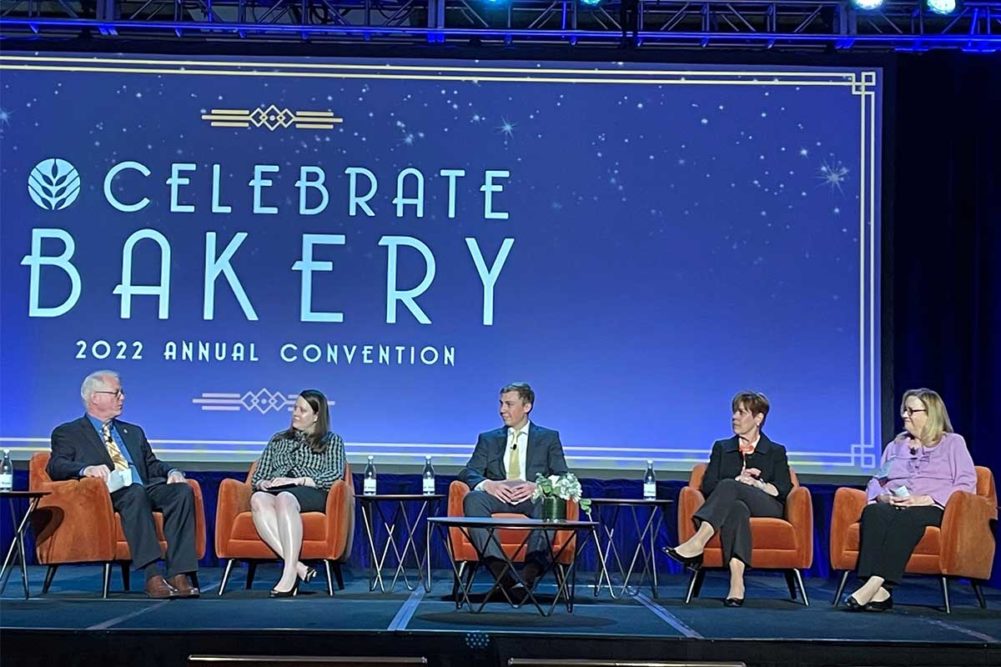LA QUINTA, CALIF. — Global supply chain issues, pandemic-related challenges and proposed nutrition labeling changes, including the government’s long-awaited definition for using “healthy” on packaging, have emerged as the latest priorities for the American Bakers Association (ABA).
And the list of potential issues continues to expand at a rapid pace.
“It just seems like every week, three more new issues get added to our plate of policy issues,” noted Robb MacKie, ABA’s president and chief executive officer, who moderated a government affairs panel discussion at the ABA’s Convention, held March 27-30.
Zack Decker, ABA’s government relations manager, noted that shipping as part of the supply chain has become a top concern.
“One aspect of the supply chain that’s gotten so much attention recently is the ocean carriers, and for good reason,” he said. “They are providing the worst levels of service at the most exorbitant costs.”
He said ABA is working with a coalition of agricultural retailers and food manufacturers to deal with the monopolistic tendencies of ocean carriers and establish minimum requirements under a shippers’ bill of rights movement.
Mr. Decker asked for bakers to catalog complaints involving shipping and supply chain issues so that the ABA can document the real life challenges that the companies and the industry as a whole are currently experiencing.
During the next six months, bakers also need to keep a close eye on several health and nutrition issues, including updates on the Standards of Identity for bread and other foods, observed Lee Sanders, ABA’s senior vice president of government relations and public affairs.
“That’s where ABA in the past has been a leader in asking for reforms to allow for innovation,” she said.
Ms. Sanders added that the Food and Drug Administration (FDA) may issue a rule that finally attempts to define use of “healthy” and impact the future of nutrient health claims.
“We could expect to see this action as early as April,” she said.
Another anticipated proposal may include the use of a “heathy seal” on food products. FDA circulated a procedural notice regarding preliminary quantitative consumer research before a voluntary symbol would be considered. The definition for the “healthy” claim and that seal may come out at the same time.
Additionally, Ms. Sanders said, the Biden administration announced its plans to hold a White House Conference on Health, Hunger and Nutrition that would focus on “affordable nutrition for all.”
In a previous 1969 conference held during the Nixon administration, she said, the three-day meeting resulted in 1,800 recommendations, of which 1,600 of those recommendations were agreed to and executed within two years.
“I think this agenda could impact all of us, and it’s important for ABA and the food industry to be at the table,” Ms. Sanders said. “I think it can encompass the expansion of universal school meals. It could include new benefits such as federal feeding programs, universal health care and prescription drug costs.”
Rasma Zvaners, ABA’s vice president, regulatory and technical services, pointed out that another critical policy initiative involves the traceability rule for the Food Safety Modernization Act (FSMA), which the FDA must finalize before the end of this year.
“FDA’s traceability rule introduced an additional layer of terminology, and it appears that there’s a lack of understanding about how the supply chain works and how food moves throughout the supply chain from manufacturing to retail or foodservice,” Ms. Zvaners said. “ABA had the opportunity to participate in supply chain education sessions with FDA, and we’re hearing some rumblings that the agency may be reproposing some parts of that rule or all of that rule, but there’s a lot that remains to be seen.”
Lauren Williams, ABA’s director of government relations, discussed several issues, including how the ABA and the business community successfully sued the Occupational Safety and Health Administration (OSHA) to block its vaccine and testing mandate.
In today’s political environment, where one party controls the presidency and Congress, Ms. Williams mentioned how such legal action could be a potential tool for the ABA and other industry associations to combat the “most onerous” regulatory overreach and encourage negotiation between governmental agencies and the business community.






